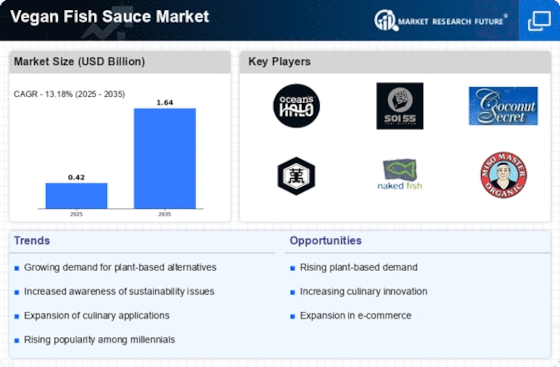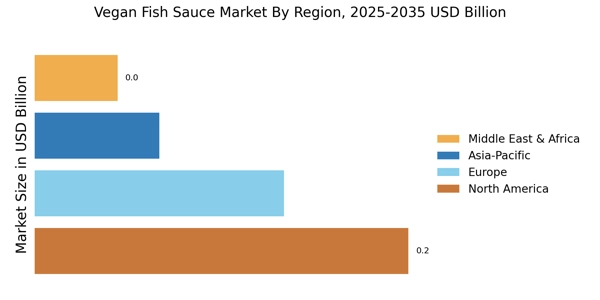Culinary Versatility and Innovation
Culinary innovation plays a pivotal role in the Vegan Fish Sauce Market, as chefs and home cooks alike explore new ways to incorporate these sauces into their dishes. The versatility of vegan fish sauce allows it to be used in a wide range of cuisines, from Asian to Mediterranean, thereby broadening its market appeal. Recent surveys indicate that over 60% of consumers are willing to experiment with new flavors, which bodes well for the introduction of innovative vegan fish sauce products. This trend is further supported by the rise of cooking shows and social media platforms that showcase creative recipes featuring vegan ingredients. As culinary boundaries continue to expand, the Vegan Fish Sauce Market is likely to see an influx of new products that cater to adventurous palates.
Growth of Vegan and Vegetarian Diets
The rise of vegan and vegetarian diets is a significant driver for the Vegan Fish Sauce Market. As more individuals adopt these lifestyles, the demand for suitable condiments and flavor enhancers increases. Data suggests that the number of people identifying as vegan has doubled in the last five years, indicating a substantial shift in dietary preferences. This growing demographic is actively seeking products that align with their values, including vegan fish sauces that offer authentic flavors without animal products. The Vegan Fish Sauce Market is likely to expand as manufacturers respond to this demand by developing a wider range of products that cater to the tastes and preferences of vegan consumers.
Influence of Social Media and Food Trends
The influence of social media on food trends is a powerful driver for the Vegan Fish Sauce Market. Platforms like Instagram and TikTok have transformed the way consumers discover and engage with food products. Viral recipes featuring vegan fish sauce are increasingly common, leading to heightened interest and demand. Recent studies indicate that food-related content on social media can significantly impact purchasing decisions, with over 50% of consumers reporting that they are more likely to try products they see online. This trend is particularly beneficial for the Vegan Fish Sauce Market, as it allows brands to reach a wider audience and showcase the versatility of their products. As social media continues to shape culinary trends, the market for vegan fish sauces is expected to flourish.
Rising Demand for Plant-Based Alternatives
The Vegan Fish Sauce Market is experiencing a notable increase in demand for plant-based alternatives. As consumers become more health-conscious, they are actively seeking products that align with their dietary preferences. According to recent data, the plant-based food sector has seen a growth rate of approximately 27% over the past few years. This trend is particularly evident among younger demographics who prioritize sustainability and ethical consumption. The Vegan Fish Sauce Market is poised to benefit from this shift, as more individuals opt for vegan options that do not compromise on flavor. The increasing availability of diverse plant-based ingredients further enhances the appeal of vegan fish sauces, making them a viable substitute for traditional fish sauces in various culinary applications.
Environmental Awareness and Ethical Consumption
The Vegan Fish Sauce Market is significantly influenced by growing environmental awareness among consumers. As individuals become more informed about the ecological impact of their food choices, there is a marked shift towards products that promote sustainability. Research indicates that approximately 70% of consumers are willing to pay a premium for products that are environmentally friendly. This trend is particularly relevant in the context of seafood alternatives, where overfishing and ocean degradation are pressing concerns. Vegan fish sauces, often made from ingredients like seaweed and fermented soy, present a sustainable alternative that appeals to environmentally conscious consumers. The Vegan Fish Sauce Market stands to gain traction as more individuals seek to reduce their carbon footprint through their dietary choices.

















